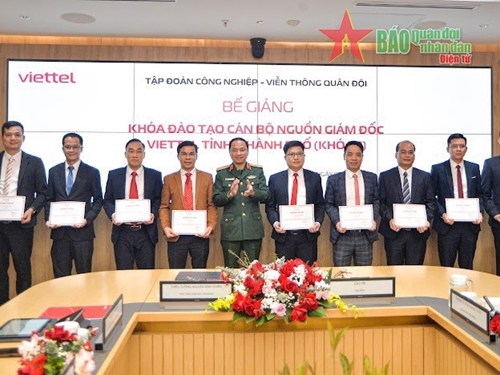The Fourth Industrial Revolution has brought about numerous challenges and opportunities. Viettel Academy is actively promoting digital transformation, enhancing training quality to meet the requirements of the corporation and the global telecommunications market in this new context.
    |
 |
|
Trainees of the refresher course for directors of Viettel provincial and municipal branches in class |
Operationalization via technology
In recent years, Viettel Academy has autonomously researched and introduced a series of new training methods and tools such as By Day Learning (daily learning), and ATM (Post-training knowledge application assessment tool). By Day Learning is an application comprising short lessons under 10 minutes covering technical, business, management, soft skills, and corporate culture, digitally transformed into lecture clips, enabling staff and employees to learn anytime, anywhere. To date, the academy has developed over 2,000 digital lessons serving 50,000 Viettel employees worldwide.
The lessons are tailored to each learner's task, empowering them in the learning and testing process. Weekly and monthly, the programs automatically record completions or send reminders, enabling individuals to select study times suitable for them. Managers and newly recruited employees participate in online courses coordinated by the academy and relevant units for a period ranging from one week to one month. After the self-study period, participants undergo quiz assessments for each lesson. Only those who get enough points can pass the qualifying round and attend direct training sessions at Viettel Academy.
    |
 |
|
Trainees of the course in a joint photo |
Throughout the learning process, the academy enhanced the usage of e-lessons, models, simulations, and presentation practices to facilitate trainees’ rapid and deep knowledge absorption. Upon completing their studies, participants register on the post-training knowledge application assessment tool (ATM). The ATM registration, directly confirmed by senior leadership, specifies timeframes, objectives, and evaluation metrics. Subsequently, Viettel Academy and the managing units continue to monitor and evaluate post-training results and the application of knowledge in practice.
Each year, Viettel Academy offers various training courses such as first-time manager courses, technical team leader courses, and potential leader courses. These courses involve rigorous entrance and graduation examinations and assessments.
Management through mechanisms
The training course for potential leaders for Viettel’s provincial and municipal branches (the 7th course, the 2023-2024 academic year) had 30 participants. Based on the pool for potential leaders, the group selected 40 personnel for a one-month online self-study program on various topics. Subsequently, the organization chose the top 30 out of 40 high-performing participants. After three months of training in management, technical skills, business administration, marketing, English, Party and political work, only the top 20 participants with the best results have proceeded to internships. This mechanism encouraged participants to be pro-active and diligent during their training.
    |
 |
|
Major General Nguyen Dinh Chien, Viettel’s Deputy General Director, presenting certificates of graduation to the trainees |
The academy collaborated with various units to propose internship topics addressing the most challenging, complex, and pressing issues such as: Methods to encourage 2G and 3G users to upgrade to 4G subscribers; fixed broadband customer growth; growth of 360 TV customers; and improvement of network infrastructure quality. After completing a three-month internship, participants come back to the academy to showcase their graduation projects to the academy's Council and the companies within the group. Participants who meet the criteria in theory, practice, and foreign languages are the only ones recognized as graduates and considered for director or deputy director positions.
Participants who do not achieve satisfactory results in practice, internships, or English proficiency tests are given an extra six months to self-study, practice, and re-submit their graduation projects. Major Dao Duy Thai, Deputy Director of Viettel Thai Nguyen Branch, expressed his gratitude for the knowledge and skills gained at the academy. The project "Solutions to enhance landline broadband subscriber quality in Thai Nguyen province" enabled him to meet his training goals and become self-reliant and confident in his new position.
    |
 |
|
The Viettel leadership awards prizes to the best trainees. |
The training course for the prospective "Deputy General Director of Foreign Markets" lasts six months, followed by a three-month internship. They later present their graduation projects to the group's and the academy’s leadership. Evidence of successful training is shown by the skilled performance of academy alumni on the global stage. Major Nguyen Huy Dung, CEO of Viettel Natcom in Haiti, a participant in the deputy general director’s training course in 2021, said, "Despite the conflict outbreak in Haiti in 2023, the company's leadership adopted a unity approach, binding Vietnamese and local people together, working hand in hand." Natcom implemented solutions such as deploying fiber optic to the national power grid, accumulating fuel, using solar energy batteries for BTS system, reinforcing store security, and enhancing online sales. "In adversity lies opportunity. While rival companies hesitated, Natcom swiftly rose to the top in technical aspects and comprehensive business at the market. These insights were all accumulated from the previous training programs," shared the Natcom CEO.
From these achievements, Colonel Bui Quang Tuyen, Director of Viettel Academy, said, "With the philosophy 'Timely training, lifelong learning,' the new tools, methods, and management mechanisms have positively contributed to learner's proactiveness and creativeness in learning; enhancing the quality of human resource training within the Group; as well as providing excellent service to partner agencies, units, schools, and businesses. Facing the new opportunities of the Fourth Industrial Revolution, the school is entering its twentieth year of development history and integrate with the national training system."
Translated by Trung Thanh